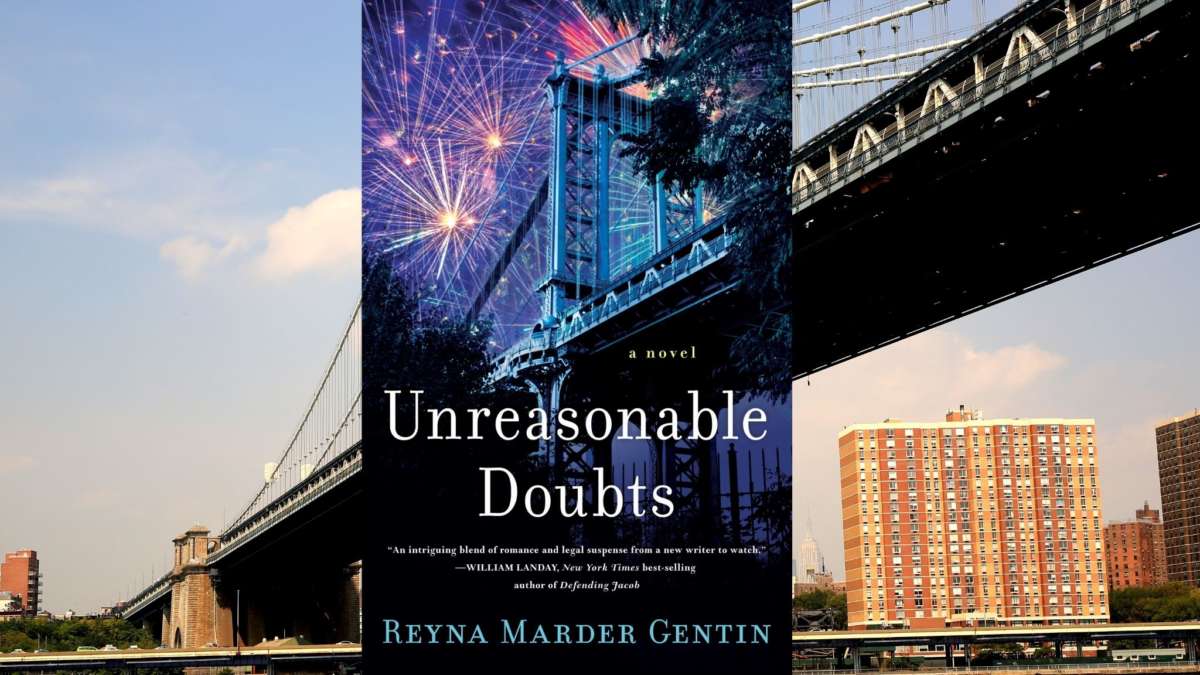Even a Yale-educated, NYC public defender with a loving boyfriend and an apartment on the Upper West Side who knows and respects the law can be thrown off course. Blinded by temptation, Liana becomes intrigued with her smart, handsome criminal client and fails to see all that she has. While friends, family and co-workers encourage her to be the best she can be with their advice and insight, Liana takes matters into her own hands and is forced to realize for herself what is right.
Read in just one day, Unreasonable Doubts (She Writes Press) kept me turning the pages as Liana follows a dangerous path. She secretly decides to explore a forbidden relationship with an accused rapist, knowing it’s wrong but drawn to his charm, while at the same time navigating her existing relationships, friendships and career. Author Reyna Marder Gentin knows how to make the unknown feels dangerous, romantic and exciting, and all the while tackling real-life questions of love, friendship and loyalty. With purposeful characters and a compelling story of law, love and temptation, I highly recommend this one!
Author Q & A
Q: Have you always been a writer and how long did it take you to write Unreasonable Doubts?
A: I have always loved to write, but I never tried my hand at it more creatively until I left the practice of law in 2014. I began working on Unreasonable Doubts in the summer of 2015, and it was published in November 2018.
Q: Tell us about your law career, and did you do additional research for the book while writing?
A: My career in law took a number of different turns. Initially, I clerked for a Federal judge and I worked as a litigation associate at a large international law firm in New York City. After that, I worked as a law guardian representing children with the Legal Aid Society, before settling in for 18 years as a criminal appellate attorney representing indigent defendants on appeal from felony convictions. The novel was inspired by my work in that office, the personalities there, and a number of the cases I worked on. I didn’t have to do a lot of research, as I was very familiar with both the law and how cases are handled.
Q: Liana is morally conflicted in her job as a public defender; she is in support of the law but gives in to temptation when it comes to getting to know the accused. Do you think this occurs often in a public defender’s office?
A: I doubt relationships often bloom between attorneys and their clients in the criminal representation context, but I’m sure it happens sometimes. Less so in an appellate office, because the attorneys and the clients rarely meet. But there are undoubtedly clients who develop feelings for their trial attorneys, and sometimes those feelings are reciprocated. Certainly, the power differential, at a minimum, should give one pause.
Q: Jakob and Danny Shea are very different and the tension and energy between Liana and Danny is palpable. Why do you think the attention Daniel gave Liana was more enticing for her than the true love Jakob exhibited?
A: I think Liana was feeling neglected by Jakob, who was giving a lot of his time and energy to his career and not quite enough to her. And Danny, who had his own motives for sure, provided a contrast — he was prepared to completely devote himself to Liana, and that was meaningful to her in the vulnerable state she was in. I also think that she was burnt out and conflicted about whether her devotion to her job was misplaced, and Danny gave her hope that there were innocent people out there that needed her help.
Q: Deb was Liana’s angel, reminding her how to be a good friend, and encouraging her to see the love she and Jakob had. It felt symbolic when Liana moved into Deb’s apartment, stepping into her environment to be surrounded by her good vibes. We all need a friend like Deb. Did you have anyone special in mind when you wrote her character?
A: Yes. I had a colleague with whom I worked who passed away from ovarian cancer in 2014. We were close, but she was also demanding in some ways. When she became ill, she gave me an unusual opportunity to step up and be a better friend, and I will always appreciate that.
Q: Liana is interested in Jewish tradition and Jakob goes along with her to synagogue to be supportive. Why did you choose to have the synagogue be orthodox?
A: As a religious person, I was interested in showing readers a different side of Judaism than they might know. Liana is not religious in the novel, but she is curious about her tradition and interested in what her heritage has to say about critical aspects of her life. She explores notions of the obligation to seek justice, how to pray for someone who is ill, and how to know if the person you are with is your “bashert,” the one you are meant to be with. Liana could have looked into these faith issues at a synagogue of any denomination; I’m most familiar with how an Orthodox community functions, so I placed her there.
Q: Rabbi Nacht felt like Liana’s conscience; he seems to be in places Liana wouldn’t expect and he forces her to look at herself. Do you have someone in your life that provides that for you?
A: Hopefully everyone has a variety of people in their life who perform this function in different circumstances. I think my husband and children hold a mirror up to me on a daily basis, usually in a helpful way! But I think good friends, spiritual leaders, fellow writers, and also readers can help to force you to define your values and make sure you’re following a path that is productive and meaningful.
Q: Jakob and his family believe Corporate Law to be a superior career choice compared to Liana’s line of work. In your experience, did you come across that opinion in the legal world?
A: Within the legal profession, people tend to respect what is financially remunerative. Corporate attorneys are paid outsized salaries, so they must be “worth” more than Legal Aid attorneys, law school professors, government lawyers, etc. With the possible exception of judges, who most of the time have had successful careers as commercial attorneys before they take the bench, people both within and outside of the profession value people who are paid more. This is of course a generalization and may be partly a generational thing. But I think many attorneys would give lip service to the idea that they value the lawyer slogging away in a low-paying, low-prestige job in a public defender’s office somewhere, but they wouldn’t trade places.
Q: Did you always know what the outcome would be while writing the book or did you decide Liana’s future as you went along?
A: I had a pretty good idea!
Q: If Unreasonable Doubts became a movie, who would you choose to play the main characters?
A: I would love to see Unreasonable Doubts as a movie; I think it has all the right elements. I’m terrible at casting though; honestly, I never know who any of the young actors are!
Q: What are you reading now and what do you recommend?
A: I am about to start Lily King’s Writers and Lovers.
Unreasonable Doubts is available for purchase.
RELATED POSTS
Erica Katz on “The Boys’ Club” and Complicit Culture in BigLaw
https://booktrib.com/wp-content/uploads/2021/02/reyna-marder-gentin-crop300.jpg
About Reyna Marder Gentin:
Reyna Marder Gentin is a former attorney who, after 18 years practicing law as a criminal appellate attorney with a nonprofit public defender’s office, began writing as a lark when a friend asked her to join her in a class at The Writing Institute at Sarah Lawrence College. That lark has since turned into a passion, and she is now the author of two books with a third on the way. When not writing, she can be found volunteering with the Pace Women’s Justice Center, baking challah, lunging and doing sit-ups at the direction of her beautiful Czech personal trainer, reading on her couch, and spending way too much time on Facebook. Gentin is married with two children.




